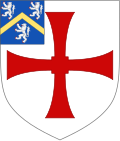It has been suggested that this article be merged into Common room (university) . ( Discuss ) Proposed since October 2025. |
Senior man is a position held in some collegiate universities by the head of a college's junior common room (JCR, the undergraduate student body). It is the equivalent term of common room president, which is the most senior prefects in college. The senior man acts as the chief representative of the student body, as a figurehead for the JCR and as an elected official. [1] The senior man is also responsible for leading the JCR's executive council.
Although terminology refers to the position as a senior 'man', a woman may also fill this role. [2] This reflects the history of these colleges, which were founded as single sex male-only institutions.
The position of senior man is only in use at one college of Durham University:
University College, the University's oldest college, also used the title of Senior Man until 2015 when it renamed the role Senior Student. Prior to this change, and the same with Hatfield College, female students had held the role of Senior Man. Similar to University College in Durham, Trinity College, Melbourne uses the title Senior Student to address their student association president [4]
St Chad's College previously used this title for its head of the junior common room up until 2018, when a motion was passed to change the title to JCR President. [1] [5] Van Mildert College JCR and MCR previously also used the term 'Senior Man' (now JCR President) and 'More Senior Student' (now MCR President) until at least 1998. [6]
No other colleges at other collegiate universities used the title 'Senior Man', with 'JCR President' being frequently used. Similarly, no Middle Common Rooms used this title, with 'MCR President' also being used with equivalent duty to that of the JCR President, the only difference is that it represent the graduate students of the college.
